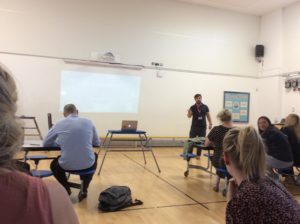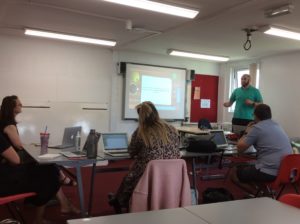 The Federation of Blenheim Road Community and Coed Eva Primary Schools
The Federation of Blenheim Road Community and Coed Eva Primary Schools
Rooted in professional enhancement and school improvement
Information about the school
The Federation of Blenheim Road Community and Coed Eva Primary Schools comprises two Cwmbran schools, situated within a mile of each other within Torfaen. Coed Eva is a two-form entry school with 450 pupils, with 30% receiving free school meals. Blenheim Road Community Primary has 270 pupils, with 49% eligible for free school meals.
Federation occurred in September 2016 resulting in the amalgamation of the respective governing bodies and leadership teams. All staff are employed on a federated contract, enabling movement of staff between sites. Furthermore, PPA and professional learning is undertaken as a federation.

Our ‘why’ is at the heart of everything for our federation. We believe that in everything we do:
- We grow thriving, successful learners
- We lead our people to excellence
- We change our community and our country for the better
Approach taken
‘The very idea of “effective” teacher professional learning can be elusive, even within an industry that has learning at its core’ (Dunn and Hattie, 2022, p.3). The need for the educational professional to simultaneously occupy the role of teacher and learner is more prevalent than ever before. Yet, school leaders in Wales must balance individual and school priorities alongside changing national imperatives (Welsh Government, 2020, Cordingley et al., 2020).
The OECD note that ‘Effective teaching is at the heart of a successful education system… supporting teachers’ professional learning from the beginning to the end of their career is critical to fostering high-quality teaching’ (OECD, 2021, p.4). Professional development must reflect the pace of global change; the uncertainty of a rapidly evolving world dictates that humans must continue their learning across their entire lives (Harrari, 2016).
Daly, Milton and Langdon (2020) note active school leadership as a key precursor for effective professional learning, requiring leaders who ‘focused on developing a learning culture within the school and were learners along with the teachers’. Sinek (2009) highlights the importance of the leader to create an environment in which great ideas can happen. Developing this culture and environment takes time; time that the collective profession often feels that it does not have (Johnson, 2019).
Personal Development:
 Personal development of all staff is crucial to the success of The Federation. As stated in The Curriculum for Wales (Hwb, 2020), ‘the four purposes should be the starting point and aspiration for schools’ curriculum design.’ However, we acknowledge that the end point for that continuum of learning is not the completion of formal education; we promote a culture of lifelong learning.
Personal development of all staff is crucial to the success of The Federation. As stated in The Curriculum for Wales (Hwb, 2020), ‘the four purposes should be the starting point and aspiration for schools’ curriculum design.’ However, we acknowledge that the end point for that continuum of learning is not the completion of formal education; we promote a culture of lifelong learning.
To facilitate this, we appreciate that it is essential for practitioners and leaders to have a deep self-awareness and understanding of themselves; we cannot change what we do not notice (Schwartz, Gomes and McCarthy, 2016). The best performers observe themselves closely… then it’s about the commitment to do what needs to be done to get where you want to be’ (Stein, 2019, p.4).
Staff have undertaken an Insights Discovery Profile, designed to provide an overview of strengths and areas for development, offering a focus for transformation. Furthermore, these insights have been shared within teams allowing a greater understanding of how to collaborate effectively, aligned with personal preference. This draws upon the work of Thomas Erikson (2019) and his research into the types of human behaviour.
The outcomes resulted in more than uncovering simple working preferences. It has offered a platform to discuss, challenge and clarify shared personal and professional values between staff. Brown (2018) notes that if we know each other’s values then we know each other. If we don’t, we don’t know one another. ‘Sharing values is a massive trust and connection builder for teams’ (p.208). This has been evident in the improved depth of relationships, empathy and cohesion within The Federation. This work has resulted in two further key initiatives (Federation Friday and Enrichment and Enquiry), closely aligned with and building on this work.
Coaching and Mentoring:
Each half term, time is set aside for coaching and mentoring training, developing all colleagues to become coaches. Likewise, all staff have a coach/mentor within The Federation, meeting to set goals, discuss difficulties and track progress. These goals are professional and personal, and the empathy, support and collaboration provided by this programme has shown tangible benefits to staff well-being and cohesion. This coaching and mentoring process has, as Sir John Whitmore described, ‘unlocked people’s potential to maximize their own performance’ (2017, p.13).
Everyone is a leader:
Everyone is a leader in our Federation. We strive to create a supportive and collaborative culture, providing the safety to allow for innovation without fear of failure or mistakes. Embracing leadership as influence, uncoupled from the hierarchy of power, means that initiatives can flourish from all areas of the staffing structure. ‘A brave leader is someone who says, “I see you. I hear you. I don’t have all the answers, but I’m going to keep listening and asking questions”’ (Brown, 2018, p.195). The culture we have created allows space and support for these leaders to step forwards.
Time:
A key pre-cursor to planning, enacting, and evaluating these practices is the time to do so. As leaders, we recognise the importance of developing our people and finding the balance of individual and whole-school professional learning needs. Leaders need to see the bigger picture, the vision, and recognise the impact of investing time, money and resources in long-term strategic development.
Accordingly, in addition to traditional ‘CPD’ time, staff training and INSET days, we have created time and space for further professional development and learning in the following ways:
Enrichment and Enquiry:
 Every Wednesday afternoon on a rotational basis, practitioners are provided with time to undertake a self-directed professional enquiry. This gives colleagues protected time to observe, visit other settings, engage in professional dialogues, research and collate findings. Utilising the Spirals of Inquiry approach (Kaser and Halbert, 2017) provides a broad outline to scaffold the inquiry process, whilst giving practitioners the autonomy to dive deeper into an enquiry relevant to them. Whilst this activity is undertaken, other members of The Federation lead the children in a broad range of enrichment activities including sports, podcasting, cooking and gardening.
Every Wednesday afternoon on a rotational basis, practitioners are provided with time to undertake a self-directed professional enquiry. This gives colleagues protected time to observe, visit other settings, engage in professional dialogues, research and collate findings. Utilising the Spirals of Inquiry approach (Kaser and Halbert, 2017) provides a broad outline to scaffold the inquiry process, whilst giving practitioners the autonomy to dive deeper into an enquiry relevant to them. Whilst this activity is undertaken, other members of The Federation lead the children in a broad range of enrichment activities including sports, podcasting, cooking and gardening.
Federation Fridays:
Observation plays a pivotal role in the development of effective teachers (Timperley, 2011), yet opportunities to observe are often limited by the lack of time to do so. To create this time, our Executive and Associate Headteachers all plan and deliver lessons across The Federation on a Friday morning. The benefits are twofold; senior leaders build closer relationships with learners and maintain their connection with teaching whilst time is created for practitioners to observe across The Federation. These observations are guided by whole-school priorities and the findings and feedback are then used to evaluate progress and highlight future priorities.
As a Federation, we recognise that change doesn’t happen from a singular project or in rapid succession. For meaningful impact, change takes time.
As noted earlier, Brown (2018) highlights the importance of leaders listening and asking questions. Conversations and building trust and relationships is crucial. Colleagues have echoed that the coaching and mentoring programme and time to undertake conversations has been pivotal to this. Taking the time to engage in difficult conversations, talk about values and trust has supported developing relationships on a wider level.
Practitioners formally reflect upon their own professional learning and development within our revised performance management cycle (re-named ‘Valuing Important Performance – ‘VIP’), with their own VIP lead. This is undertaken in a quantifiable and qualitative manor to identify the individual and collectives’ perspective of progress being made towards our professional learning.
The Schools as Learning Organisation survey (HWB, 2021) demonstrates a positive trend of increased participation within professional learning and equally, our own personalised Federation surveys and feedback collection reflect the increased engagement levels to professional learning (including self-directed study outside of our school hours).
Colleagues provide feedback on staff training sessions which not only develops our personal and professional training programme, but also the individual/group of people delivering the training.
It is a widely accepted concept that the efficacy of a group of individuals will far outweigh a single person’s output (Harris, 2008). However, creating the right culture to allow this is more challenging.
At The Federation, we have reflected deeply to uncover what the barriers are to effective professional learning, and how to mitigate them. It has taken a concerted effort from every person within The Federation to bring about change. Gladwell (2000), describes the idea of a ‘tipping point’, where the moment of achieving a ‘critical mass’ results in radical change. By empowering our staff through seeking to understand them as individuals, matching them with likeminded mentors and utilising all staff to manufacture time we have been able to begin progress towards a tipping point: a point where all staff are committed, invested and enabled to move forwards; for themselves, and simultaneously for the organisation and our learners.
References:
- Brown, B. 2018. Dare to Lead. London, Penguin Random House.
- Cordingley, P., Higgins, S., Greany, T., Crisp, B., Araviaki, E., Coe, R. and Johns, P. (2020) Developing great leadership of CPDL. [Accessed 3rd January 2022].
- C., Milton, E. and Langdon, F. (2020). How do ecological perspectives help understand schools as sites for teacher learning?, Professional Development in Education, 46(4), pp. 652-663.
- Dunn, R., and Hattie, J. 2022. Developing Teaching Expertise. Thousand Oaks (CA), Corwin Press.
- Erikson, T. 2019. Surrounded by Idiots. Penguin Random House.
- Gladwell, M. 2000. The Tipping Point: How Little Things Can Make a Big Difference. Little Brown Publishers.
- Harrari, Y. N. 2016. Homo Deus. London, Penguin Random House.
- Harris, A. (2008). Distributed School Leadership: Developing Tomorrow’s Leaders. Abingdon: Routledge.
- HWB 2020. Developing a vision for curriculum design. [Accessed 20th December 2021].
- HWB 2021. Schools as Learning Organisations. [Accessed 4th January 2022].
- Johnson, S. 2019. Where Teachers Thrive – Organizing Schools for Success. Harvard Education Press.
- Kaser, L and Halbert, J. 2017. The Spiral Playbook: Leading with an inquiring mindset in school systems and school. C21 Canada.
- Sinek, S.. 2009. Start With Why: How Great Leaders Inspire Everyone to Take Action. London, Penguin Random House.
- Stein, J.R.A. 2019. Raise Your Game. New York, Hachette Book Group.
- Timperley, H. 2011. Realising the Power of Professional Learning. Open University Press.
- The Colour Works. 2021. The Insights Discovery Profile. [Accessed 20th December 2021].
- Welsh Government. 2020. Education in Wales: Our National Mission. [Accessed 4th January 2022].
- Whitmore, J., 2017. Coaching for Performance Fifth Edition. Mobius.

